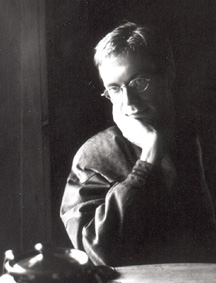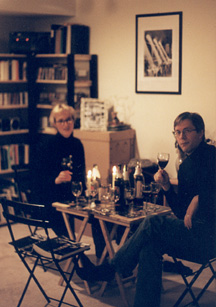
About James Harbeck
What do you do for a living?
I'm an editor, designer, and writer. I am the author of the blog Sesquiotica, where you can find out what I'm really like.What's on your bookshelf?
Too much to list exhaustively, but here are highlights:Books on 40 languages other than English, a few of which I speak passably or marginally, a few more of which I know at least a bit about, and the rest of which I'll get to.
Scores for Handel's Messiah and the last movement of Beethoven's 9th Symphony, staples of the Toronto Mendelssohn Choir's seasons (we have to give back all the other scores when we're done with them).
Books by Umberto Eco as well as by other writers on semiotics.
A number of books on Buddhism, especially Zen, notably by Thich Nhat Hanh, but also by an assortment of others (I particularly recommend The Empty Mirror by Janwillem van de Wetering for those interested but not long experienced with Zen).
Quite a few books by and about C.G. Jung and related topics. Nothing at all by or about Freud – I can borrow those from a library if I need them.
Books by Niccolò Machiavelli – The Prince, Discourses – whom I appreciate especially for his play La Mandragola and for his wit and intelligence. He's generally misunderstood.
Modern Music, by Paul Griffiths.
Books by Arthur Koestler (The Act of Creation, The Ghost in the Machine) and Edward de Bono.
The Death and Life of Great American Cities, by Jane Jacobs.
Collected poems of Salvatore Quasimodo, bought in Florence on my honeymoon and worthwhile for anyone with even a bit of Italian (and a dictionary).
Poetry by T.S. Eliot and a few others.
Fiction, notably by Terry Pratchett, J.K. Rowling, Kurt Vonnegut, and J.R.R. Tolkien, as well as by W.G. Sebald and some others (Eco is included in this though mentioned earlier).
The complete, unexpurgated scripts of Monty Python's TV shows.
A large number of classics of world literature, almost all of them belonging to my wife, Aina Arro, who read many of them while touring as a professional figure skater.
Books on calculus and on relativity as well as a couple of physics and math quick references.
Travel guides (all used in location) for such places as L.A., Chicago, London, Italy, Israel, England, the Caribbean, New Zealand, and Iceland.
A decade's worth of linguistics texts accumulated in a decade's worth of linguistics education part-time while working as an editor.
Copies of the Literary Review of Canada, which I design.
More than 160 volumes of plays, most of which volumes contain several plays each, acquired in the course of getting a BFA, MA and PhD, all in theatre. With few exceptions they have been touched only to pack and unpack them when moving since I finished my last degree in 1998.
Most of the books of Richard Schechner, who was the subject of my dissertation.
A complete set of the Encyclopedia Britannica, 1964 edition, which I relieved my grandmother of when she was moving to someplace too small to contain them.
Masterworks of the No Theater, by Kenneth Yasuda. This is, yes, a volume of plays, but it's an especially good book, and my play Cordelia owes much to it.
An assortment of books on dramatic theory and criticism, theatre history, cultural studies, and so on.
The National Geographic Atlas of the World. This edition, aside from being heroin for a map addict, is noteworthy in that it was published just at the time the USSR was breaking apart and Germany was reuniting.
Books on art, notably a book of collected art from the Albright-Knox Gallery in Buffalo and Phaidon Press books on Jenny Holzer, Gian Lorenzo Bernini, and Gerhard Richter.
Books on medieval history and culture.
Illustrated books of Edward Lear verse and at least two volumes of Calvin & Hobbes cartoons (my collection of Doonesbury books is in my parents' basement, along with many other books I wouldn't mind having back within reach).
A limited-edition leather-bound copy of Stoney Country 1970–1980, a celebration of the place where I grew up, filled with photos (and some text) by my dad, Warren Harbeck.
Bound volumes of my master's thesis (Paratextual Pragmatics: A study of usages of printed paratexts in commercial and nonprofit theatre in Boston, 1993–4) and my doctoral dissertation ("Containment Is the Enemy": An ideography of Richard Schechner).
Memoirs of a Depression Bum, by Robert G. Baldwin (my step-grandfather) as told to Dorothy Baldwin (my grandmother) with illustrations by me.
Offprints of articles I've published in journals (PDFs of some of the originals can be downloaded from my home page).
The Ultimate IQ Challenge, edited by Marcel Feenstra, Philip J. Carter, and Christopher P. Harding; it contains some puzzles by me.
Copies of Active Voice, the newsletter of the Editors' Association of Canada, which I designed for three years (and then decided I needed a rest from it).
Copies of MC², the national magazine of Mensa Canada, which I used to edit and design.
Dictionaries, books of quotations, a thesaurus, and similar reference books.
A few translations of the Bible, including one in German and New Testaments in Irish Gaelic (Tiómna Nua), Koine Greek, and Esperanto.
1000 CDs with music covering about eight centuries, with a certain emphasis on medieval/Renaissance music and 20th-century music of a wide range of types. The kinds of music I don't like are few indeed.
And quite a few other random bits and pieces.
So, um... what about your professional skills?
You can find out about my editorial skills and background in my profile on LinkedIn. If you're interested in seeing my résumé, please email me at seamus@harbeck.ca; be so good as to say who you are and what your interest in it is.
All contents © 2000–2013 James Harbeck
seamus@harbeck.ca

